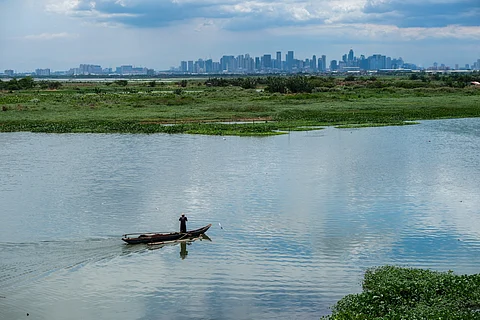
- NEWS
- the EDIT
- COMMENTARY
- BUSINESS
- LIFE
- SHOW
- ACTION
- GLOBAL GOALS
- SNAPS
- DYARYO TIRADA
- MORE

The Senate on Wednesday approved an act institutionalizing the Philippine Ecosystem and Natural Capital Accounting System in the country.
During the plenary session, the upper chamber agreed to the adoption of Senate Bill 2439, also known as the PENCAS Act, which is also included in the Legislative-Executive Development Advisory Council's priority bills under the Marcos administration.
SB 2439 seeks the institutionalization of PENCAS and recognizing natural ecosystems as an integral part of our patrimony and heritage; protect and promote ecological balance and resilience, as well as advance the right of the people to live in harmony with nature.
The measure mandates the use of PENCAS in policy and decision-making, designating the agencies responsible for its implementation, and providing institutional arrangements among responsible agencies.
In her previous interpellation, Senate Pro Tempore Loren Legarda underscored the importance of passing the PENCAS law, saying it will "provide the country with clear directives from government agencies to have the data to assess the physical and monetary worth of ecosystems, including forests, watersheds, and coastal and marine areas."
PENCAS is also seen to support the government's targets under the Philippine Development Plan 2023-2028, particularly in Chapter 1—the "Accelerate Climate Action and Strengthening Disaster Resilience" with a primary aim to strengthen the resilience of communities, institutions, and ecosystems to the impacts of natural hazards and climate change.
Legarda previously lamented the lack of accounting in the country's natural resources—a major driving force to the Philippine economy.
To recall, the Philippines was among the first countries in the world to conduct national capital accounting in the 1990s through the Natural Resource Accounting Program—a project of the Department of Environment and Natural Resources.
Also, the National Statistical Coordination Board has also implemented the same via the Philippine Economic Environmental and Natural Resources Accounting System.
Once passed, the PENCAS bill will provide the national government with important data that will integrate nature in planning, policymaking, and budgeting that will be in line with standards set by the System of Environmental-Economic Accounting of the United Nations.
Legarda earlier noted that it was high time to go beyond the human factor in quantifying the Philippine economy, informing the populace of the state of nature's contribution to the gross national product.
"Our economic indicators have been nature blind. We undervalue or do not value at all our ecosystems that are the very basis of our economy," she said.
"We measure our gross domestic product based on goods and services, and we also measure our human capital, but we do not measure our natural capital."
Natural capital is defined by the bill as the "stock of renewable and non-renewable resources, including plants, animals, air, water, soils, ores, and minerals, that provide a flow of benefits to people and living things," including, but is not limited to, ecosystem services such as air and water filtration, flood protection, carbon sequestration, pollination of crops, and habitats for wildlife.
